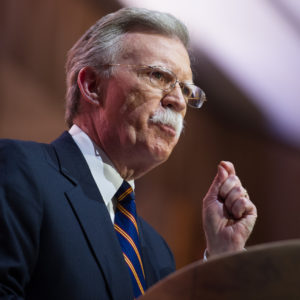SEOUL — The appointment of John Bolton as President Trump’s national security adviser portends a tough U.S. policy toward North Korea even as South Korea’s President Moon Jae-in is planning to meet the North’s Kim Jong-un in late April and Trump is to see Kim in May.
Conservatives in the United States are applauding Bolton’s appointment in place of H.R. McMaster, an Army lieutenant general who is not seen as quite hawkish enough.
Bolton’s appointment comes as a shock to American liberals, who are pulling out all the stops to attack him for the hard-line views that he has been expressing for years.
South Korean officials are making a show of their eagerness to get along with him but privately have misgivings. Might he not ruin chances for a successful Moon-Kim summit and then advise Trump not to see Kim at all?
Bolton, who served as U.S. ambassador to the United Nations under President George W. Bush for 18 months, has been angering critics in the United States and overseas for years for his advocacy of strong, decisive action against perceived threats, including chemical and biological as well as nuclear warfare.
“The Legal Case for Striking North Korea First” — that was the headline over an article that he wrote for the Wall Street Journal before we ever got the news that Kim Jong-un would meet with either Moon or Trump.
“Does the necessity of self-defense leave ‘no choice of means and no moment of deliberation,’” the article asked, making clear the United States should be ready to strike North Korean nuclear and missile facilities before the North had the chance to develop the means to attach a warhead to a long-range missile capable of reaching targets in the United States.
Bolton justified striking North Korea pre-emptively in view of what he saw as “gaps in U.S. intelligence about North Korea.” Indeed, “We should not wait until the very last minute,” he wrote, maintaining it was “perfectly legitimate for the United States to respond” to North Korea’s nukes “by striking first.”
He’s been equally hawkish about Iran, arguing that Barack Obama should never have entered into the agreement under which Iran promised not to go on developing nuclear warheads while focusing on nuclear power. His warlike approach to Iran jibes perfectly with that of Trump, an outspoken critic of any agreement that he believes would ultimately give Iran an upper hand in the great conflict of forces in the Middle East.
“Time is terribly short,” Bolton wrote in the New York Times before the agreement was adopted in 2015, “but a strike can still succeed.” The Israelis, he suggested, should have free rein to bomb Iran’s nuclear facilities before Iran had the chance to produce its first warheads.
Like Trump, Bolton feared the agreement had “huge loopholes” through which Iran was “driving its missile and nuclear programs.” A pre-emptive attack by Israel, he said, “should be combined with vigorous American support for Iran’s opposition, aimed at regime change in Tehran.”
So right wing is Bolton’s position that analysts are inevitably asking whether Kim Jong-un will want to consider a summit at which Bolton would probably be present in his new role as national security adviser. His appointment comes after Trump named the CIA director, Mike Pompeo, as secretary of state in place of Rex Tillerson, who had a considerably more conciliatory view.
Trump is thought to have been restrained from taking more extreme action by his secretary of defense, Jim Mattis, along with Tillerson and McMaster. They are not at all dovish but cautioned against any action that might result in retaliation by North Korea in the form of artillery strikes capable of killing thousands in the Seoul-Incheon region where half of South Korea’s 51 million people live and work.
President Moon appears likely to try to make the best of Bolton’s appointment, obviously hoping that he will tone down his views in the run-up to Moon’s meeting with Kim in April. In that spirit, a Blue House spokesman assured everyone that “we will be cooperating closely with President Trump, the national security adviser and the secretary of state.”
What counted, said the spokesman, who did not want his name used, is not what Bolton thinks “but how the entire U.S. government and President Trump will try to resolve this issue” of North Korea’s nuclear program. Bolton, he said, has to have his views aligned with those of President Trump, and we will be providing sincere cooperation.”
It will be interesting, however, to see what Bolton has to say about the Winter Olympics, at which Moon welcomed a North Korean team marching with South Korean athletes under the “one Korea” flag of a light blue image of the Korean peninsula against a white field.
After attending the Opening Ceremonies of the Olympics, Kim Jong-un’s younger sister presented Moon a letter inviting him to a summit. After the Olympics a delegation of Blue House officials went to Pyongyang, meeting Kim Jong-un as he expressed his “willingness” to meet Trump and talk over denuclearization.
Bolton in his Wall Street Journal article said “North Korea’s propaganda effort” at the Olympics was intended “to divert attention from its nuclear-weapons and ballistic-missile programs” and predicted the next “U.S. action against the Kim regime … may be a very rough thing.”
Pompeo, Bolton noted, had said that North Korea was within months of developing the means to attach warheads to long-range missiles. Given these comments, it seems certain that Bolton will advise Trump against any deal that might appear as a compromise on demands that Kim abandon his nuclear program as a condition for moving ahead on rapprochement with the United States or South Korea.

